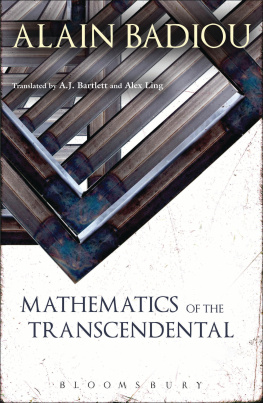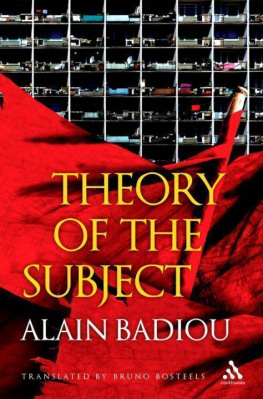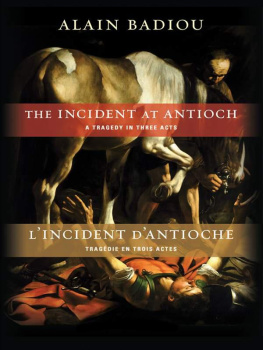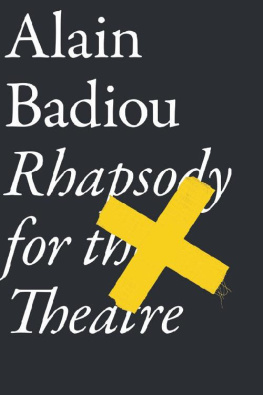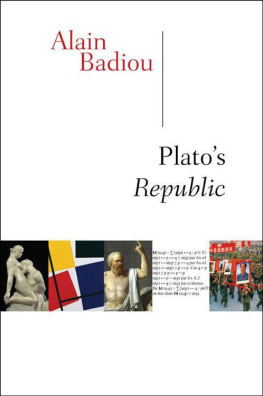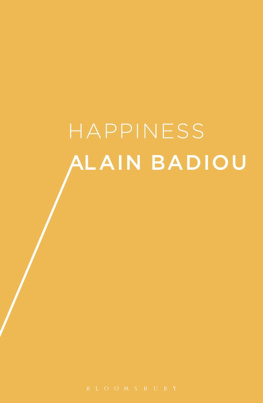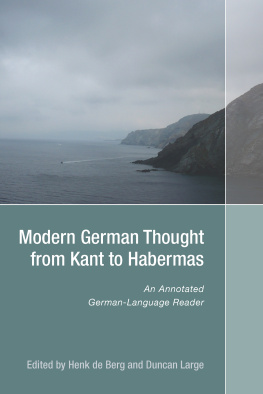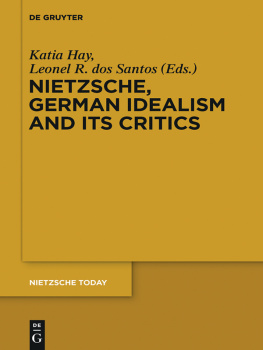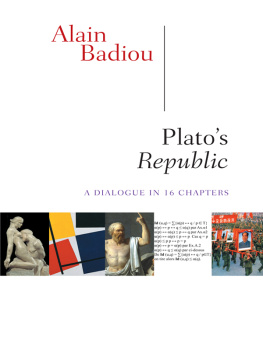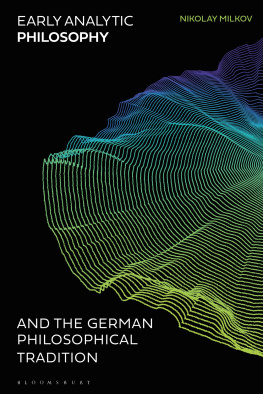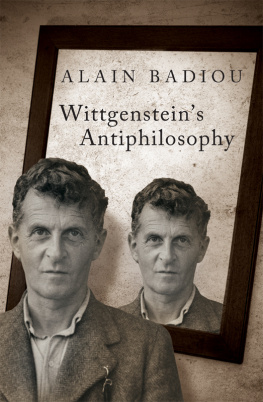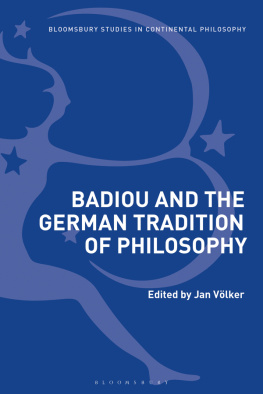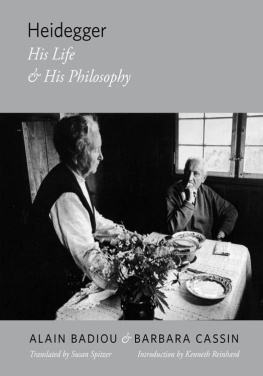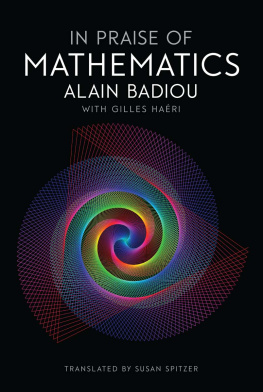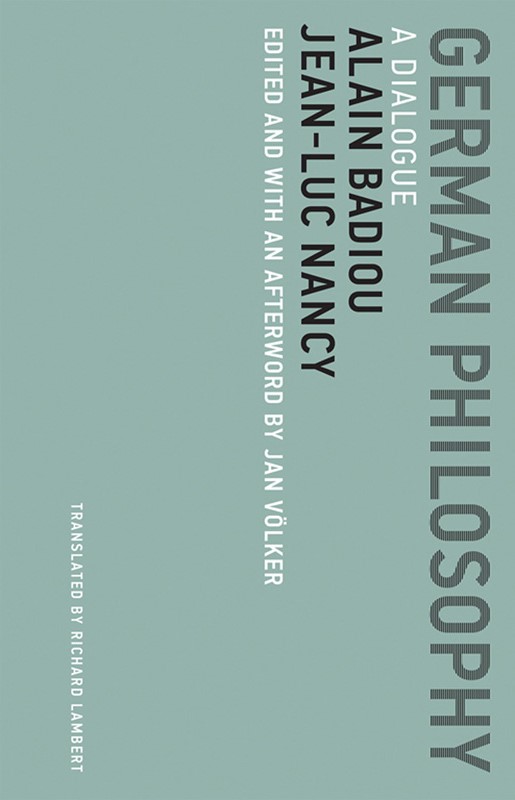Untimely Meditations
1.The Agony of Eros
Byung-Chul Han
2.On Hitlers MEIN KAMPF: The Poetics of National Socialism
Albrecht Koschorke
3.In the Swarm: Digital Prospects
Byung-Chul Han
4.The Terror of Evidence
Marcus Steinweg
5.All and Nothing: A Digital Apocalypse
Martin Burckhardt and Dirk Hfer
6.Positive Nihilism: My Confrontation with Heidegger
Hartmut Lange
7.Inconsistencies
Marcus Steinweg
8.Shanzhai: Deconstruction in Chinese
Byung-Chul Han
9.Topology of Violence
Byung-Chul Han
10.The Radical Fool of Capitalism: On Jeremy Bentham, the Panopticon, and the Auto-Icon
Christian Welzbacher
11.German Philosophy: A Dialogue
Alain Badiou and Jean-Luc Nancy
12.Portrait of the Manager as a Young Author: On Storytelling, Business, and Literature
Philipp Schnthaler
13.Waste: A New Media Primer
Roberto Simanowski
14.The Death Algorithm and Other Digital Dilemmas
Roberto Simanowski
This translation 2018 Massachusetts Institute of Technology
First published as Deutsche Philosophie: Ein Dialog in the series Frhliche Wissenschaft at Matthes & Seitz Berlin: MSB Matthes & Seitz Berlin Verlagsgesellschaft mbH, Berlin, 2017.
All rights reserved. No part of this book may be reproduced in any form by any electronic or mechanical means (including photocopying, recording, or information storage and retrieval) without permission in writing from the publisher.
This book was set in PF DinText Pro by Toppan Best-set Premedia Limited. Printed and bound in the United States of America.
Library of Congress Cataloging-in-Publication Data
Names: Badiou, Alain, author. | Vlker, Jan, editor.
Title: German philosophy : a dialogue / Alain Badiou and Jean-Luc Nancy ; edited by Jan Vlker ; translated by Richard Lambert.
Description: Cambridge, MA : MIT Press, 2018. | Series: Untimely meditations ; 11
Identifiers: LCCN 2017060981 | ISBN 9780262535700 (pbk. : alk. paper)
eISBN 9780262348348
Subjects: LCSH: Philosophy, German. | Philosophy, French. | Discussion. | Badiou, Alain. | Nancy, Jean-Luc.
Classification: LCC B2523 .B3313 2018 | DDC 193dc23 LC record available at https://lccn.loc.gov/2017060981
ePub Version 1.0
Table of Contents
Guide
The following dialogue took place on January 30, 2016, as part of a conference at the Berlin University of the Arts (UdK). Thanks are due first of all to Alain Badiou and Jean-Luc Nancy for accepting the invitation to participate in this wide-ranging debate, and for their willingness to revise the resulting transcription. They also agreed to respond to two further questions (on Adorno and the contemporaneity of philosophy), which are included in the following text. Funding for the conference was kindly provided by the German Research Foundation (DFG). Finally, special thanks are due to Alexander Garca Dttmann, who played a key role in making this dialogue possible.
VLKER
Id like to begin with a very general question. For both of you, German philosophy plays an important role in your works, as does the question of the timeliness of philosophy, that is, the timeliness of its intervention in the present. How would you assess the state of the philosophical relationship between France and Germany?
BADIOU
In my view, philosophy exists in a discontinuous manner. I believe there are certain philosophical periods. The idea of a continuity, a tradition, is in any case an academic idea. And as for the idea that the human being is a philosophical animal, that philosophy exists always and everywherethats a platitude of contemporary journalism. There are discontinuous philosophical periods, and we can locate them historically. There was, of course, the great Greek philosophical period. There was a great Arabic period, appended to this Greek period. In the seventeenth century, there was a French period that began with Descartes and included Malebranche, Spinoza, and Leibnizeven though Leibniz was German and Spinoza a Flemish Jew. At the end of the seventeenth century and the beginning of the eighteenth century, there was an English period with Locke, Hobbes, and Hume. Then there was a German period that we now know as German Idealism, with Kant, Fichte, Schelling, and Hegel. And it seems to me that in the twentieth century there was something like a Franco-German period, which revolved around phenomenology. It began quite early, with Husserl, and then Heidegger, and in France we had Sartre, who went to Berlin just before the war, and Merleau-Ponty. What we are seeing today is perhaps, and Im taking a risk here, the end of the French periodor the French touch, as the Americans say, who contributed much to its academic popularity. And if we look a little closer, this is perhaps also a Franco-Slovenian periodlets not forget Slavoj iek and his followers. As I said, this period began with phenomenology and particularly with a complicated relationship to Heidegger in Derrida, Lacoue-Labarthe, Nancy, and Ricoeur. It continued through French structuralism, as marked by Lacan and Foucault in particular and sitting before you now are two late representativestwo survivorsof this approach.
So what was this French period, which began as a Franco-German period and then became increasingly French until it came to represent France in America? It was, I believe, an attempt to establish philosophy in what I would call a new place. The aim was not to circumscribe philosophy in an academic fashion, but rather to relate it to its outside in an extremely vital way, to nourish it on literature, painting, cinema, mathematics, and psychoanalysis, while also breathing new life into the vitalism of Nietzsche and Bergson, as Deleuze did. In this way, all of these thinkers sought to establish a renewed critical role for philosophy, with close ties to the political. There were, of course, different tendencies. There was Derridean deconstruction. There were the postmoderns, like Lyotard. There was the Strasbourg school, with Lacoue-Labarthe and Nancy. And then there were more individual endeavors, such as my own, which I would gladly describe as neoclassical. In sum, then, the philosophical relationship between France and Germany passed through a period of great exchange and proximity between the 1930s and the 60s, or a little longerin any case over a long time that, rather remarkably, included the Second World War.
So where are we now? Id say we are probably at the end of this period. And we dont know where we are going. There is great uncertainty about the fate of philosophy in general, especially where the Franco-German relationship is concerned. In fact, it seems to me that the question of the state of philosophy today, as reflected in the Franco-German relationship, is one that will depend on youI mean, in light of where we are holding this discussion, on you young Germans, but of course also on those young French people who are interested in philosophy.
Before I finish, Id like to add that I have long been in favor of the fusion of France and Germany. Im not a great champion of Europe. What is Europe, ultimately, without Russia, without Turkey, clinging to a defensive and rather uncreative relation to its former imperial grandeur? No, what Id like to see is the fusion of France and Germany. One single country, one single federal state, and two main languagesthats quite possible. France is an old country, crushed by the weight of its history, shriveled up and conceited for no reason. Germany, on the other hand, is a very uncertain country. It doesnt know what it is; its desperately looking for itself, and always has been. If we were to fuse France and Germany we would put an end to dear old France and give Germany a real youth. And what would philosophy be then? Well, I think it would be truly Franco-German. And that would perhaps be its most glorious period of all. Thats my contemporary myth.


